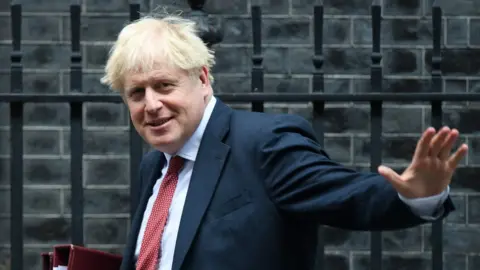Brexit: Ministers plan laws overriding part of withdrawal deal
 EPA
EPAMinisters are planning new legislation that could override a key part of last year's EU withdrawal agreement.
The move could change the nature of new Northern Ireland customs arrangements intended to prevent a return to checks at the border with the Irish Republic.
Downing Street said it was a standby plan in case EU-UK trade talks fail.
Meanwhile, Boris Johnson said that, if a trade deal is not reached by 15 October, both sides should "move on", which would still be a "good outcome".
Although the UK formally left the EU in January, it has continued to follow rules set in Brussels during a transition period - which ends on 31 December - while discussions over a long-term trade agreement continue.
Another round of talks - the eighth - begins on Tuesday, aimed at securing a deal to allow companies to trade without taxes or customs checks.
But Mr Johnson is expected to tell EU leaders it must be agreed in time for the European Council meeting on 15 October if it is to be in force by 1 January.
"If we can't agree by then, then I do not see that there will be a free trade agreement between us, and we should both accept that and move on," he will say.
'Good outcome for the UK'
The UK has said it wants a deal with the EU which resembles Canada's, which gets rid of most, but not all, tariffs on goods traded.
But Mr Johnson will say no deal means having a "trading arrangement with the EU like Australia's", using terms set by the World Trade Organisation. In practice, this would mean taxes on exports and customs checks.
"That would be a good outcome for the UK," the prime minister will say.
During trade talks, the UK and EU have been at loggerheads over two issues in particular - the future of fisheries and state aid, the money given by governments to help companies.
The EU says the UK is trying to give itself an unfair advantage by applying different rules on state aid, but the UK insists it should have control over this as a sovereign country.
Michel Barnier, the EU's chief negotiator, told French radio on Monday: "The British would like the best of both worlds - export their products to the European market on their terms."
'Electrifying development'
Meanwhile, the government will publish its Internal Market Bill - designed to protect trade arrangements between the four parts of the UK - on Wednesday.
This could contradict the Northern Ireland Protocol, set up to prevent a hard border between Northern Ireland and the Irish Republic, which many fear could be detrimental to peace.
The protocol says Northern Ireland will follow some EU customs rules - meaning customs declarations for goods moving from Northern Ireland to Great Britain, as well as some new checks on goods going from Great Britain into Northern Ireland - after the transition period.
The Financial Times said the bill would "eliminate" the legal force of the Withdrawal Agreement, struck less than a year ago between the UK and EU, in areas including state aid and Northern Ireland customs.
BBC political correspondent Chris Mason described the proposed bill as an "electrifying development in the Brexit process".
European Commission President Ursula von der Leyen tweeted that she trusted the UK government "to implement the Withdrawal Agreement, an obligation under international law and prerequisite for any future partnership".
She added that the Northern Ireland Protocol was "essential to protect peace and stability on the island and integrity of the single market".

What does Brexit mean for the Northern Ireland border?
By John Campbell, Northern Ireland economics and business editor
The Northern Ireland part of the Brexit deal, known as the protocol, was agreed in October last year.
It is designed to prevent a hard border in Ireland - or even any new checks at the Irish border.
It does this by effectively keeping Northern Ireland in the EU's single market for goods.
This will mean products entering Northern Ireland from the rest of the UK will be subject to new checks and controls - the so-called Irish Sea border.
However the precise nature of these checks needs to be agreed by the EU and UK and this is being negotiated in parallel with the trade talks between the two.
The government says it's still committed to the protocol but it could make its own decisions on how it is implemented if it cannot reach agreement with the EU.

Labour's Jonathan Ashworth told BBC Radio 4's Today programme: "Boris Johnson told us he had an oven-ready deal. And he fought a general election telling us he had an oven-ready deal. [This] now suggests that he was misleading people in that general election.
"And Parliament supported the Withdrawal Agreement earlier on this year. He has made promises and signed a treaty around these arrangements for Northern Ireland, and he now seems to be backing out of that."
Northern Ireland Deputy First Minister Michelle O'Neill tweeted that any threat of backtracking on the protocol would be a "treacherous betrayal which would inflict irreversible harm on the all-Ireland economy and the Good Friday Agreement".
Scottish First Minister Nicola Sturgeon said the move would "significantly increase" the likelihood of a no-deal Brexit, and the "resulting damage to the economy will be entirely Tory-inflicted. What charlatans".
Government sources told the BBC the legislation was "not intended to derail the talks", and a spokeswoman said the UK would continue to approach talks with the EU in good faith.
"As a responsible government, we are considering fallback options in the event this is not achieved, to ensure the communities of Northern Ireland are protected," she said.
